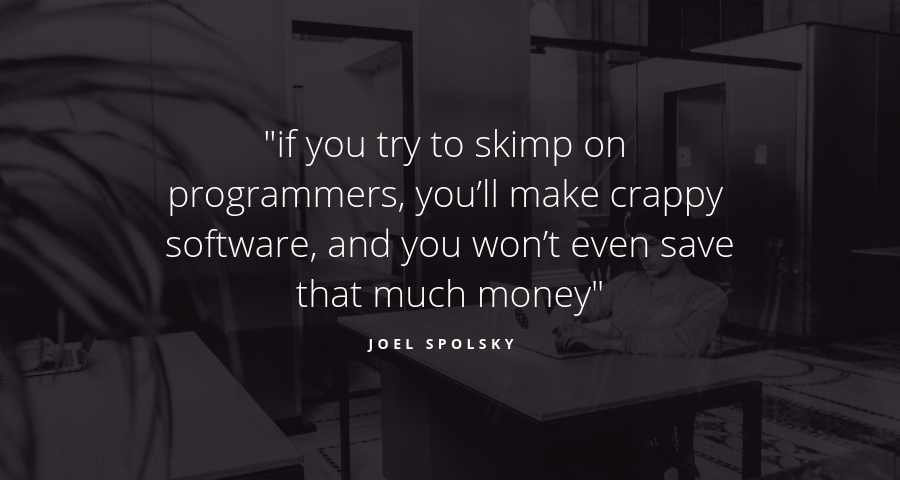
Joel Spolsky wrote that line more than a decade ago and it still rings true now.
To succeed with your blockchain project through the current crypto winter you are going to have to excel at finding the mythical 10x developers. You'll have to out-recruit those well funded projects that used the last crypto boom to amass a warchest of funds.
Here are 4 ways that will help you rise above the rest - to recruit the best smart contract developers for your crypto startup.
#1 Start with the why
In his TED talk Simon Sinek explains how leaders inspire action by focusing on why.
As a founder your job is to figure out why your company is differentiated and what is your Unique Recruitment Proposition.
This is not the same as your product's Unique Value Proposition - although that can be one of your recruitment propositions. In addition to you product, your recruitment propositions could be things like the impact employees can have in the role, your culture, work environment etc. Beware of using salary on its own as a differentiator. There will always be someone who can pay better than you can!
#2 Treat your recruitment process like a product
You iterate your product development. Apply that same mindset for your recruitment process.
Measure your recruitment funnel and seek feedback from candidates about what does or doesn't work throughout your funnel.
Use that feedback to learn and continually improve your recruitment process.
#3 Look critically at how you source candidates
The best candidates are probably not actively looking for new roles. Those 10x engineers might be on the lookout for something new, but they are not out there scouring job boards. So how do you make sure that your role has the most chance of being seen?
-
Open source code: review open source projects on places like Github in fields related to yours. Note down the contributors who consistently put out well thought out changes, tools etc.
-
Chat channels: Every smart contract platform worth its salt has a developer chat channel on Telegram, Discord or Slack. Find out where your developer community hangs out and see who is posting and answering questions frequently. The way someone replies to posts can give you great insight into their thought process, problem solving and writing skills. Just be careful to ensure your posts meet the discussion's guidelines.
-
Some of those will be employed directly by the platform and possibly out of your league. However good developers know other good developers and so if you approach them in the right way they may be able to refer you to someone who is open for recruitment.
-
There will often be developers who spend considerable amounts of time answering others questions for the love of the project. These are good candidates who may be open to a direct approach.
-
-
Hackathons: Many smart contract platforms arrange hackathons to build out their base of developers (e.g. EOSIO, Hedera, Tron). These hackathons attract a wide range of people who are united about their passion about learning about the smart contract platform. Both attendees and mentors can be a good source of potential candidates.
-
Crypto events/meetups: many founders I see speaking at blockchain meetups focus their presentations as investor pitches missing out on another key audience that will be attending; potential recruits. If you can, contact the organiser beforehand to get an understanding of the audience demographic. If the crowd is more developer friendly then your standard VC pitch deck won't do. Focus your presentation more on your uniquness as a company whilst mixing in what interesting problems you're resolving.
-
Other chains: Enough of the crypto tribalism! Yes an Ethereum solidity developer may not be familiar with C++ and how smart contracts are deployed on EOSIO. But any decent developer should be able to learn a new programming language and smart contract architecture; having programmed any smart contract platform gives them a leg up.
I come from the EOSIO space, and the following are good places to put the above into practice:
- Telegram groups: https://t.me/eos_jobs, https://t.me/eos_opportunities, https://t.me/joinchat/Esi1OkPktgcFeJ3Lmlcrqg (developer chat)
- Reddit: https://www.reddit.com/r/eosdev
#4 Have your interview process mirror the work they will do
I'm not a fan of online coding interview style tests. At most use those for an initial screen, but I find they give a weak signal about a candidate's capabilities. Similarly questions about algorithms perhaps only help if you are recruiting someone to spend time doing that.
I have found great effectiveness in having your interviewees complete a piece of work that approximates the work they will be doing with you. Think out of the box. It could be anything from a design guide, debugging a piece of SW or even developing a simple smart contract on a test net. There is a small upfront investment in getting these kinds of tests set up. But once you do, then you are able to quickly filter out for people who get things done.
How about you?
What's your favourite way to recruit smart contract developers for your blockchain project? Let me know in the comments.

Comments